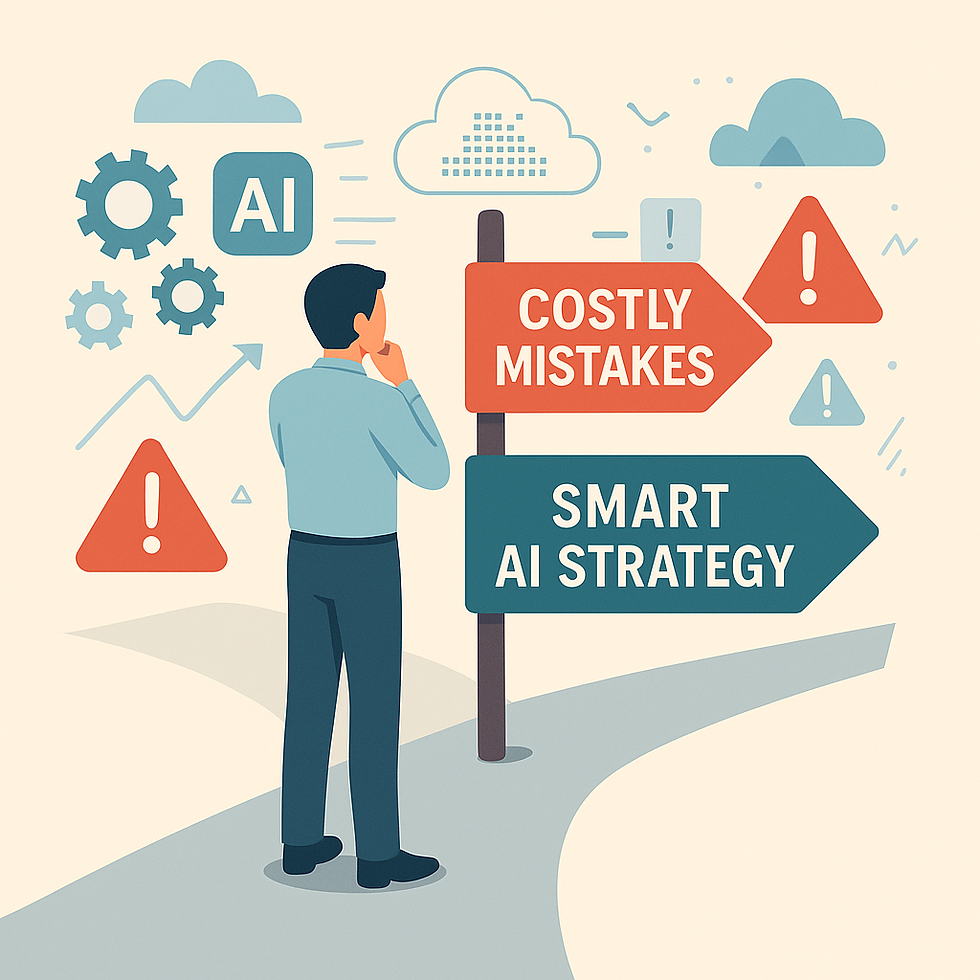The Top 3 Ways AI Can Actually Hurt Your Small Business (and How to Avoid Them)
- Mark Sandefur
- Jul 21, 2025
- 2 min read
Artificial Intelligence is transforming industries—and small businesses are no exception. The right AI tools can save time, reduce costs, and open up new growth opportunities. But like any powerful technology, when misapplied or misunderstood, AI can do more harm than good.
Here are three of the most common ways AI can hurt your small business—and what to do instead.
1. Over-Automating at the Cost of Customer Experience
The Risk: Many small businesses are tempted to replace too much of their customer interaction with AI-powered chatbots or automated workflows. While these tools can reduce manual work, they can also create a cold, frustrating experience for customers if not properly designed.
The Consequence: Poorly implemented automation can damage your brand, increase customer churn, and cost you more in lost sales than you save in labor.
What to Do Instead: Use AI to assist your team, not replace it. For example, let chatbots handle basic inquiries but route complex issues to a real person. Always include a clear way for customers to reach a human when needed.
2. Choosing Tools That Don’t Fit Your Business Model
The Risk: With the explosion of AI tools on the market, it’s easy to get excited and adopt systems that aren’t aligned with how your business actually works. A sales team might implement an AI-driven CRM that’s too complex for their needs, or a retail business may use forecasting software that doesn't account for seasonal nuances.
The Consequence: You waste time, budget, and staff buy-in trying to force the wrong tools to work—which can stall progress and lead to "AI fatigue."
What to Do Instead: Focus on strategy first. Understand your workflows, pain points, and goals before evaluating tools. Better yet, bring in a neutral expert who isn’t incentivized to sell you a particular solution.
3. Opening the Door to Data Risks and Compliance Headaches
The Risk: Many small businesses don’t realize that using AI platforms often means handling sensitive customer data. If you're feeding client information into unsecured systems or not reviewing vendor data practices, you may be exposing your business to compliance violations (e.g., GDPR, HIPAA) and data breaches.
The Consequence: One data leak can shatter customer trust, trigger legal action, and damage your brand reputation.
What to Do Instead: Always evaluate the data handling policies of any AI tool you use. Understand where your data is stored, who has access, and how it's secured. Implement internal policies around AI use and train your team on responsible practices.
Final Thought: AI Is Powerful—But It's Not Plug-and-Play
Most small business owners don’t have the time to evaluate the risks and nuances of every AI tool on the market. That’s why a high-level, vendor-neutral AI strategy is so important.
If you're considering AI but want to make sure you're not stepping into a trap, get a free AI Readiness Audit from JKS Advisory.
It’s designed specifically for small business leaders who want to harness AI the smart way—without risking customer trust, employee efficiency, or compliance.
Click here to request your free audit and let’s make sure your AI strategy is helping—not hurting—your business.



.jpg)